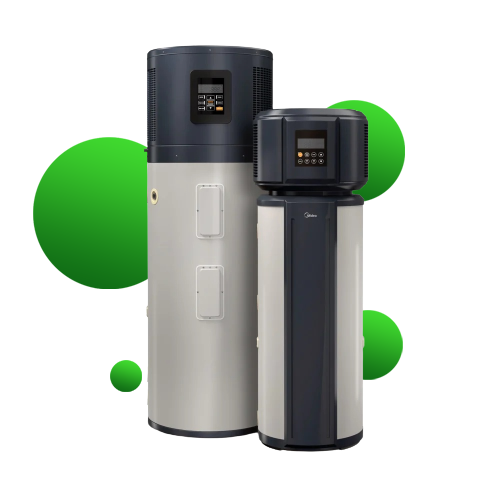
Free Heat Pump Hot Water Systems (Under VIC Government Program)
Water heating contributes to 36% of the total energy cost in Australian businesses. This number rises to 40% if you’re living in colder regions of Australia.
The energy cost arising from water heating also depends on the type of water heater you’ve installed.
Commercial Hot Water System Upgrade Under VEU
To recompense the high upfront cost, the Victorian government is offering rebates to eligible Victorian businesses who are planning to replace a traditional water heater with an efficient air-sourced heat pump water heating unit.
A hot water heat pump extracts heat from outdoor air and transfers it to the water storage tank. Heat pumps deliver a sizable reduction in energy costs and emissions because it harnesses ambient heat quite efficiently.
An air-sourced heat pump hot water system works on the principle of vapour compression refrigeration cycle. Your home appliances like fridge and aircon also work on the same principle.
A hot water heat pump is more like a fridge working in the opposite. Instead of pumping the heat out—as the fridges and air-conditioners do—it extracts heat from ambient air and transfers it to the water.
Now you might be wondering how a heat pump will work in winter when it is cold outside and air temperature is well below zero °C? Even if you’re living in an alpine region where ambient temperature drops to minus 40 °C, the air still holds some thermal energy that a heat pump can draw out.
Remember, the absolute zero (when there is no heat left) is 0 degrees kelvin, i.e.-273.15 °C.
Annual energy cost of water heating (in a 4 member Australian household having a heat pump and consuming 150 litres of hot water a day) in off-peak tariff is about $145. If the same household had installed a gas water heater, it would have cost them $505 – which is 348% more.
To know about the 348% rise in the energy cost, let’s see what Air Source Heat Pump (ASHP) water heating system is and how it works?
Government rebates for replacing conventional water heaters with heat pumps
Under the Victorian Energy Upgrades (VEU) for businesses, the government is offering rebates for replacing existing small (having 2-5 KW power) gas/electric resistance hot water system with a small size heat pump hot water systems and medium size (5-10 KW power) heat pumps water heater upgrade. The actual incentive / rebate amount varies, corresponding to the values of variables like:
- Heat pump kW rating
- Installation and administrative costs
- Coefficient of Performance (CoP) /efficiency of the installed heat pump unit
- VEU certificate price
- Potential reduction in water heating energy usage
Who is eligible?
Victorian households and businesses that have conventional electric resistance water heaters are eligible for rebates on water heater replacement or upgrade.
Is the replacement free?
Water heater replacement and heat pump installation if free. However, a business / homeowner may be charged (or not if the product is completely covered by government rebates) on the product price.
How does a Victorian business claim the rebate?
Here are the steps involved in claiming rebates on water heater replacement with air-source heat pump in Victoria:
- You share a document verifying the property ownership and the details of your current water heater.
- Give us a rough estimate of daily hot water consumption at your business.
- We’ll offer you a quote based on the product picked by our licensed plumbers and heat pump water heater technicians.
- Our plumber and heat pump installer will inspect the installation site for feasibility and convenience of wiring and piping.
- Once the installation is complete, we will claim the rebate on your behalf and deduct the rebate amount from the cost of the product.
What is an air source heat pump water heater?
It is a reverse refrigerator. The natural heat flow (from hot to cold body) is reversed in ASHPs. These water heaters absorb heat from ambient air and transmit it to water storage in your home or business.
It is an electricity powered appliance that amplifies the heat extracted from outdoor air by running the refrigerant in the refrigeration cycle through evaporator coils, compressor, condenser coils (or heat exchanger) and expansion valve.
How does the ASHP water heater system work?
In simple terms, an ASHP water heater moves heat from ambient air to water. The electricity is used to move the heat. The refrigerant liquid flowing through the evaporator coils absorbs ambient heat. The liquid then flows through the compressor.
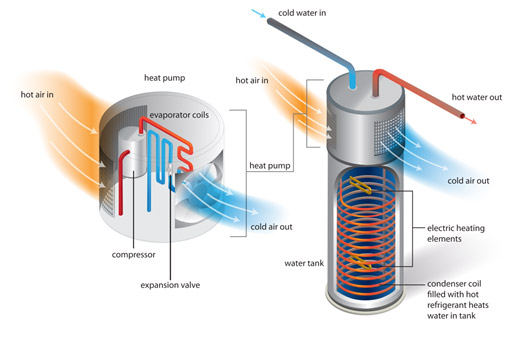
Types of heat pump water heaters
We can classify heat pumps into three major groups:
Air source heat pumps (ASHPs)
Ground source (or Geothermal) heat pumps (GSHPs)
Absorption heat pumps
Air source heat pumps
ASHPs move heat from ambient air to refrigerant liquid to heat the water. The heat pumps are 50% more efficient than conventional electric resistance water heaters. ASHPs can be used both for space and water heating purposes.
Based on its design, air-source heat pumps can further be classified into:
- Integrated heat pumps (Evaporator coils and fan are mounted on water storage tank to form a single unit).
- Split system heat pumps (Evaporator and fan are separate from water tank and the system will work even if the both units can be placed at different locations).
Advantages electric heat pump powered water heater offers over conventional water heaters?
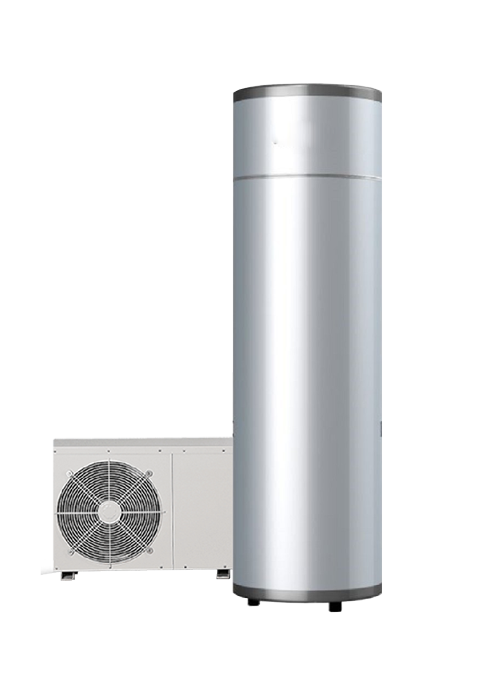
ASHP water heaters outrun conventional water heaters on the following parameters:
- Efficiency: ASHP electric water heaters are 50-60% more efficient than conventional electric resistance and natural gas-powered water heaters
- Carbon emissions: Electric ASHP water heaters are a low (even zero if they are powered by solar panels) carbon-emission and environment-friendly alternative to conventional water heaters.
- Coefficient of performance (COP): High COP between 2.5-3.5
- Lower running/operating cost
- Lesser maintenance cost
- Long lifespan
- Safety: ASHP water heaters are safer than natural gas-fuelled water heaters as they are not combustion-based and don’t pose a risk of fire.
- Government rebates
What are heat pump water heaters best suited for businesses?
There are several factors that determine the best suitability of ASHP water heater for a business and household. Before replacing your water heater with ASHP, you need to consider:
- Size
- Constant temperature function
- Thermal insulation of water tank
- COP
- Heating capacity
- Flow rate in case of tankless ASHP water heater
- First hour rating
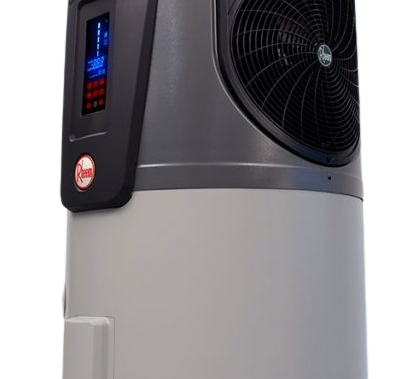
Will it work in colder climates?
Even in sub-freezing temperatures, ASHP water heaters are the best appliance to decarbonize reduce energy use, and save money on utility bills.
Modern heat pumps (including heat pumps we install under the VEU program) have variable-speed air compressors driven by a variable frequency drive (a motor controller that supplies varying frequency and voltage to control the speed of the heat pump compressor).
This enables the heat pumps to move heat even in freezing weather conditions when the temperatures are well below -20 °C.
Heat pumps are more than twice as efficient as fossil fuel heating systems in cold temperatures, research shows. Even at temperatures approaching -30C, heat pumps outperform oil and gas heating systems, according to research from Oxford University and the Regulatory Assistance Project think tank — The Guardian.
Present-day heat pumps also use lower boiling point refrigerant liquid. Such refrigerants can draw heat from sub-zero ambient temperatures and continue to flow through the evaporator coils of the heat pump.
Factors affecting the performance of heat pump
A host of factors affect the performance and efficiency of ASHP. The major factors are:
- Frequent changes (increase/decrease) in temperature set point.
- Stained and grubby evaporator coils.
- Not doing regular maintenance tasks.
- Leaks.
- High hot water usage.
- Outdated shower-heads and faucet fixtures.
- Exposed water pipes.
- Uninsulated water tank .
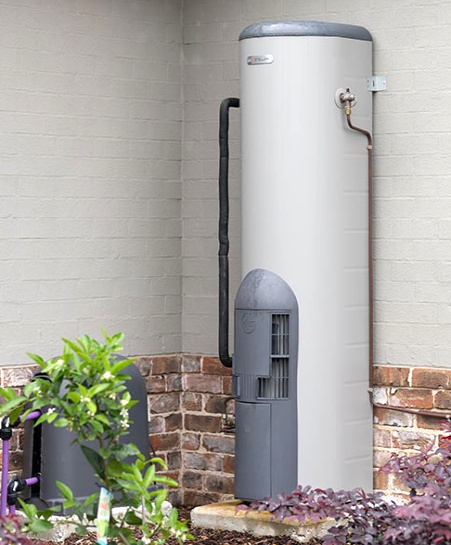
Things to consider before installing air-source heat pump water heaters
Before installing the heat pump, an installer should:
- Check the location and space where the homeowner or business is planning to install the pump.
- Ensure that the bearing surface is level and able to bear the weight of the heat pump water heating system.
- Think about the final position of the exhaust fan.
- The circuit breaker and power cable current ratings match with the recommended current ratings.
- Airflow at the planned installation site.
- Ensure that the heat pump system is kept upright all the time (even during the installation).
- Discuss the operational noise level with homeowner or business manager.
- Read the installation instructions listed in the product manual.
After the installation, ensure that:
- All the components of the heat pump are working fine.
- The pump system and pipe work are earthed to avoid electric shocks.
- The minimum inlet water pressure is maintained at the recommended level.
- All the mandated building and plumbing standards are being met.
How to choose among different sizes of heat pumps?
Picking a suitable size heat pump hot water system is a crucial step in the conventional water heater to heat pump upgrade process.
If you install a larger size heat pump that don’t match your business or household hot water needs, there will be standing/operational losses, and you won’t find any significant drop in electricity bills.
In the case of a smaller size heat pump, you’d often find running out of the hot water in the depths of freezing winters.
Factors contributing to energy cost of heat pump water heater
- Air compressor efficiency and type
- Electricity tariff
- Efficiency of water heater
- Hot water usage
- Length and insulation of connecting pipes and water storage tank
- Leakages (if any) in connecting pipes, faucets, or water heater system
- Local climate
